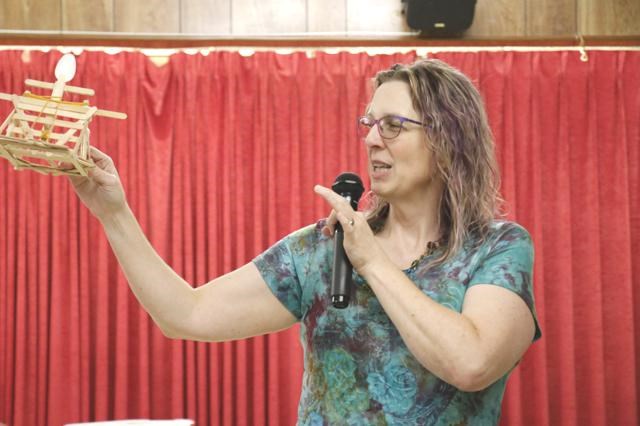By Greg Nikkel
Physics teacher Karen Kennedy-Allin is not content to simply pass on her knowledge of physics concepts and laws, but wants her students to explore and learn them first-hand in the classroom.
Members of the Weyburn Rotary Club heard how the award-winning teacher has begun a new approach to her class, and some of her reasons for being a teacher.
She won the Award for Excellence in Teaching High School Physics last year from the Canadian Association of Physicists, and spends time each year at the Perimeter Institute of Theoretical Physics in Waterloo, Ont., where she passes on her knowledge in how to teach physics.
“Everything I do I’ve learned from somebody else,” she said, noting she spent 10 days at the Perimeter Institute this past summer as a facilitator, helping to put on a workshop for teachers.
Kennedy-Allin noted the world-renowned institute studies all aspects of physics, including string theory, quantum mechanics, relativity and black holes, and she has been going there since 2008. She laughed when asked if she met a “Sheldon Cooper” there, referring to the theoretical physicist in the comedy series, “Big Bang Theory”.
“There are lots of Sheldon-like people there. I’ve been there five times, and I was very surprised because I thought everybody’s going to be so nerdy. There are jock nerds, and nerds who always correct the professor,” she said.
Kennedy-Allin explained about two hands-on projects she has her Physics 30 class do each year, to build a mini-catapult for throwing marshmallows, and building a rollercoaster design using tubing and a steel ball. In both cases, students must design and build the respective project, and it has to work. In addition, they have to show all the calculations of physics concepts that were displayed by the project, such as calculating the potential and kinetic energy, and the velocities involved.
For the catapult, she demonstrated it by lobbing a marshmallow all the way to the back of the room. “They have to keep all the variables constant, but only change the angle for the right trajectory,” she explained, adding of the rollercoaster, the aim is to turn potential energy into kinetic energy, and build a design that successfully carries the steel ball from the top to the bottom.
“I let them ‘trial-and-error’ it, which frustrates them to no end. With the rollercoasters, there’s lots of stopping and going, and I try to give them space to do it, because that’s what it’s all about,” said Kennedy-Allin, adding she has been doing these two particular projects for a number of years now.
In addition, she applied and was accepted to be one of the teachers involved in writing the new Physics 30 curriculum for the province, and so was well aware of what new changes were going to be in place for the new school year. She was also able to pilot the new curriculum last year, and for this year has begun a new approach of videotaping her notes for the students to watch prior to class.
She notes the Perimeter Institute is a proponent of inquiry-based learning, and this approach she is trying is based on that concept. She records the notes for a unit in a video which can be accessed on-line, or on flash drives for rural students, and this frees up class time for doing hands-on practical projects.
“Student talk is way more important than teacher talk,” she said, noting she encourages her students to talk with each other as they work on projects and learn the concepts together in a practical way. “They don’t need me for the notes, then we have all this class time to work on these projects. We’ve been doing this for three weeks now, and I’ve had six videos, with two a week. There’s the odd one who hasn’t been watching, but I know who they are.”
Kennedy-Allin admitted she was scared to try doing this approach, because she wasn’t sure that it would work, and that students would take to it. She enjoys teaching the Physics 30 class because it’s an elective, although every year there is the odd student who takes the class because they want to do the rollercoaster project.
In addition to her classes, Kennedy-Allin is also president of the teachers association for the Southeast Cornerstone School Division, and represents them to the Saskatchewan Teachers Federation in Saskatoon as well as to the director of education for Cornerstone.
“I find that very exciting as well. It’s good to advocate for other teachers, so I have a meeting with the director every six weeks. We don’t always agree on everything, but that’s exciting as well,” she said.




